JULY 25, 2019
LANCE OLSEN: NO ONE WANTS TO TALK ABOUT OVERPOPULATION BUT IT, ALONG WITH FOSSIL FUEL-DRIVEN ECONOMIC GROWTH AND RESOURCE CONSUMPTION, ARE SETTING US UP FOR A CRASH, HE SAYS by Lance Olsen
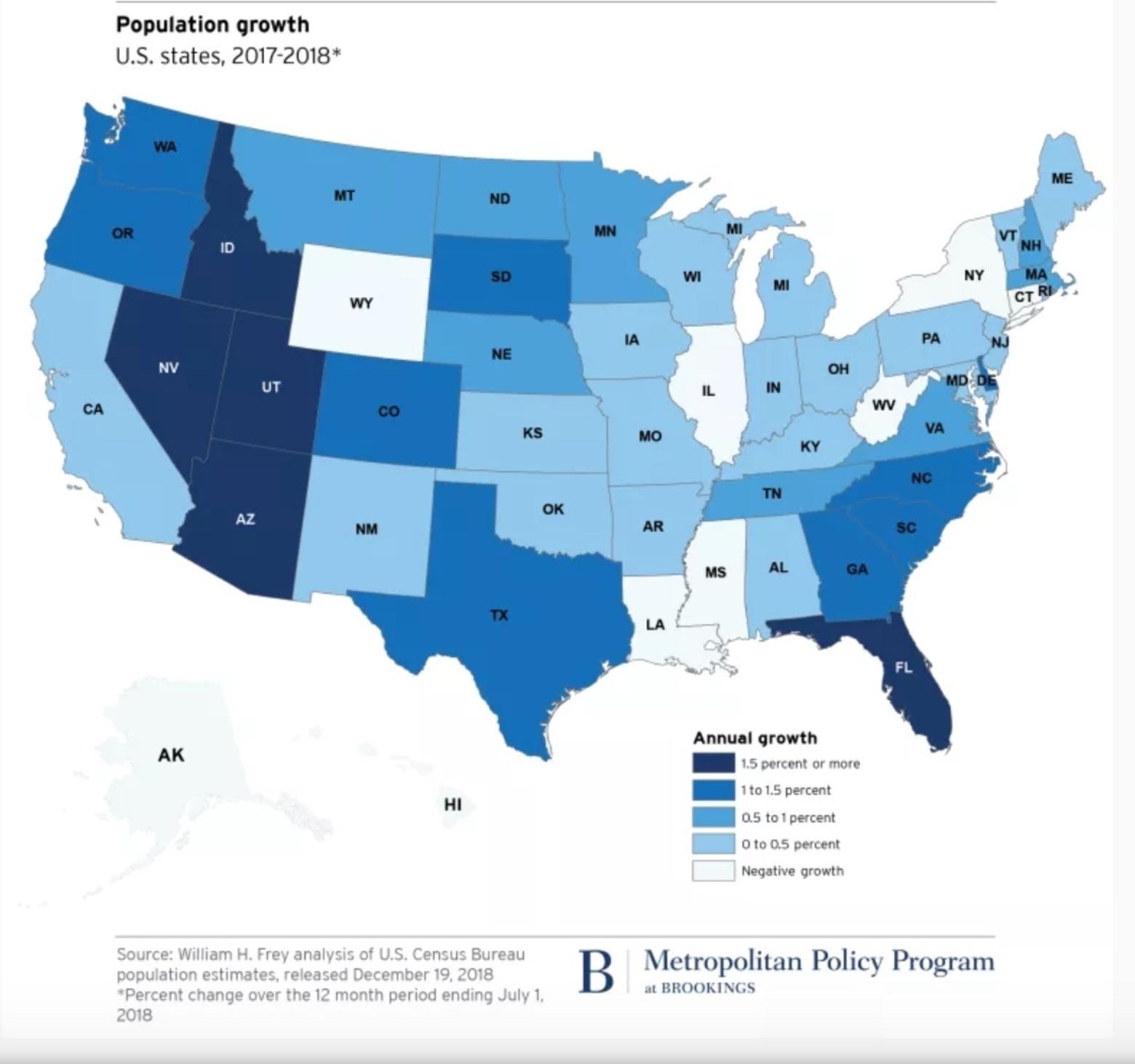
Map courtesy William H. Frey/Brookings Institution Robert Thomas Malthus wrote about it and so has a series of others, including Paul Ehrlich, Donella Meadows and many of her contemporaries, pondering how exploding human population, unsustainable resource extraction and our consumption of varying kinds of raw materials can outstrip nature’s ability to function.
Yet onward we’ve continued, paying no heed to the consequences of premising prosperity on an existential belief. It is the orthodoxy that growth and markets are the answer to everything, and that markets lead to technological innovation which will ostensibly rescue us from whatever crisis we get ourselves in, no matter how dire.
Indeed, the continuing human population boom has been the bedrock of an economic boom registering across sector after sector. It has also, according to at least some observers, been setting the foundation for its own bust. That’s old news.
It’s true that the population is surging beyond our borders but even shifting areas of human concentration all around the world are resulting in greater stresses on finite resources.
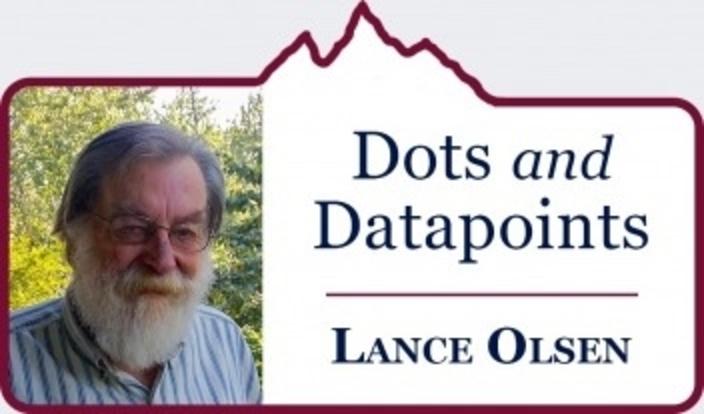
In the US alone, the booming human population has been the wellspring for surging numbers of visitors to the likes of Yellowstone National Park, city managers in the region bent on promoting inward growth, the basis of soaring demand for logging to supply housing for a growing human herd, and the foundation of profit boom for the fossil fuel combustion industries. But where is it leading?
Booms enjoy considerable public approval and political popularity. Over and over again, the long-ongoing human population boom has afforded the political elites and local boosters an opportunity to boast of a booming economy on a never-ending upward trajectory, sometimes raising local and even national concerns about touting growth at any cost.
Bust, on the other hand, is a dirty four-letter word.
We all know what follows an economic boom. In the preface to his 1992 book on the economic history of the United States, James Grant reminded readers that, “Booms have consequences.”
Politicians and local boosters promising delivery of booms seldom if ever mention consequences, but they’re no secret to a state like Wyoming that has elected successions of leaders over the past 50 years who have claimed they will be the first to deliver a natural resource boom without a devastating bust. All have failed. Have you been reading the headlines relating to the downward spiral of coal and no back-up plan for dealing with this bust?
In July, 2001, The Economist advised its readers that “It is no coincidence that the deepest and most protracted recessions in recent decades have taken hold in countries that experienced booms.”
So, too, can it be applied to states, be they in the rust belt, textile hubs, Appalachian coal country or outposts on the high plains.
More broadly, William R. Catton focussed on what follows a human population boom in his 1980 book, “Overshoot: The Ecological Basis of Revolutionary Change. ” As one reviewer put it, “Catton believed that industrial civilization had sown the seeds of its own demise and that humanity’s seeming dominance of the biosphere is only a prelude to decline.” Catton spelled out his warning of decline in considerable detail, but the basics are — or should be — clear enough.
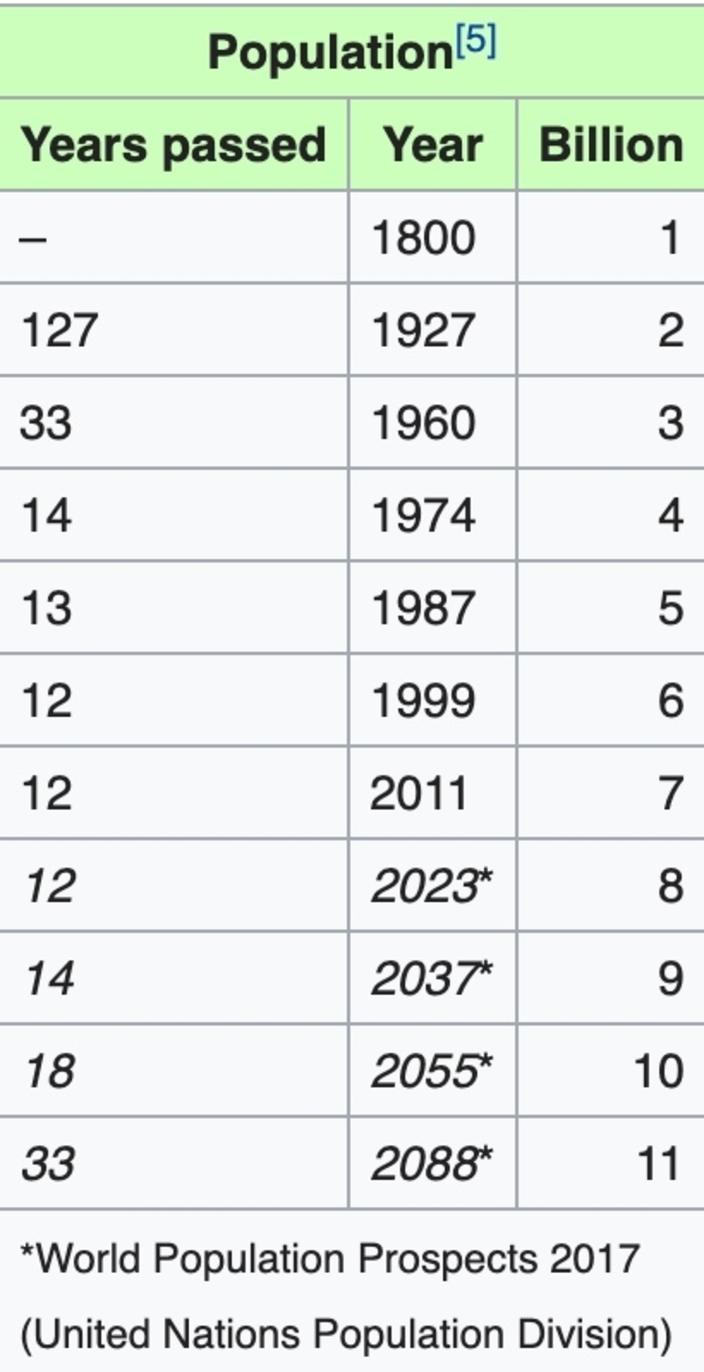
° ° ° °
As a kid, I had the benefit of grownups who calmly informed me that, if you put 150 cows on acreage that can only support 15, you won’t have 150 cows for long. It’s about the same with people. Today’s 7 billion and tomorrow’s expected 9 or 10 billion can’t last on a planet capable of supporting maybe only one billion in comfort.
Former Federal Reserve Chairman Alan Greenspan, a devotee of Ayn Rand and who served during the George W. Bush Administration, warned in 2005, three years before the start of the Great Recession, that wealth disparities stood to destabilize the economy and others note that the widening gaps between uber-wealthy and working class threaten to destabilize democracy, which means destabilization of the world.
A Pew study found that 84 percent of the world lives below the US poverty line so if the goal is to elevate the billions of others to our level of resource consumption, what does that mean for the impact of resource extraction on the planet?
But that inevitability is no longer likely to hit solely from overshoot alone, and not in some far-distant future. Instead, with the added pressure from our booming combustion of fossil fuels, a human population bust could plausibly be kicked into gear sometime “by” — a.k.a. before — 2050, or within the next 30 years.
Climate scientist Kevin Anderson has advised anyone willing to listen that, if we fire up the fossil fuels enough to hike atmospheric heat by 4C, only around half a billion people will survive. Anderson says, “I think it’s extremely unlikely that we wouldn’t have mass death at 4 degrees C. If you have got a population of nine billion by” — a.k.a. before — “2050 and you hit 4 degrees C, 5C or 6C, you might have half a billion people surviving.”
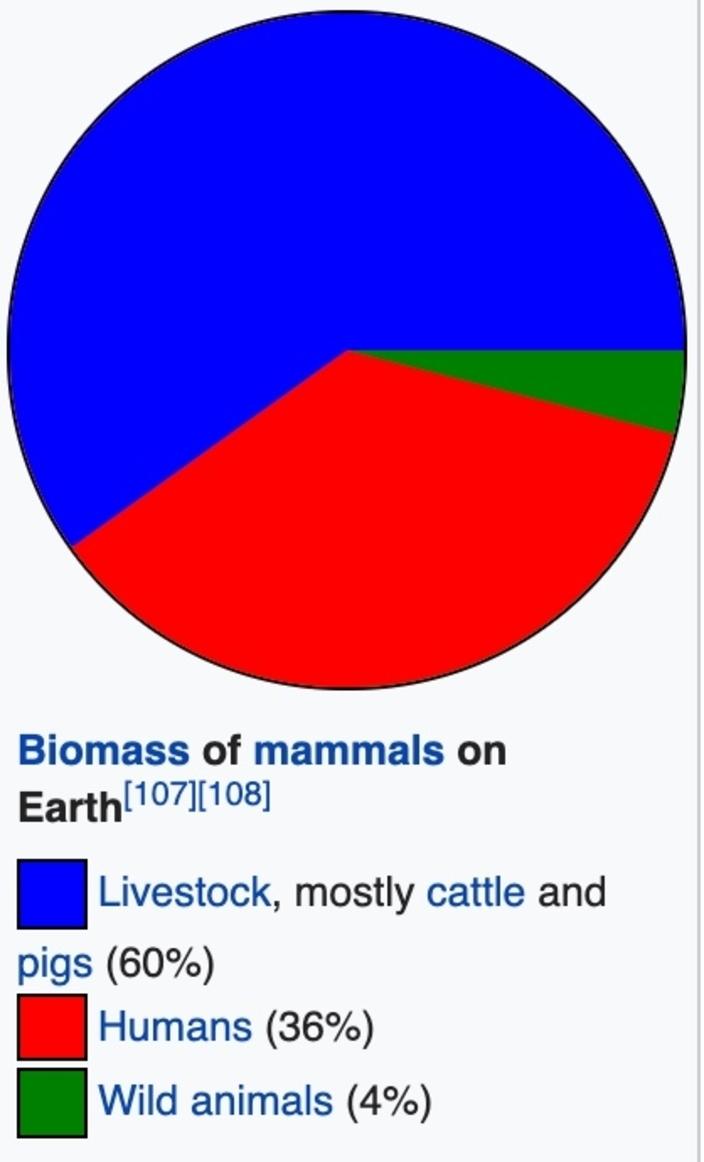
The consequences of human die off at that scale would sprawl widely across both ecological and economic realms. Just in economic terms alone, it would trigger a mass loss of customers for every business and industry across the world. The numbers of tourists flocking to US national parks like Yellowstone and Yosemite would plummet with people obviously worrying more about other things rather than how they’re spending leisure time.
Vast supplies of housing would be left vacant, and the demand for logging crushed. In an irony to cap all ironies, the mass consumption of fossil energy would hit the floor. All in all, Anderson’s stark scenario would add up to economic catastrophe beyond compare.
In other words, nearly every job and industry we associate with American greatness and prosperity would be threatened.
But even the rise in average temperatures don’t have to be that extreme to be extreme.
Anderson’s reference to reaching 4 degrees C added heat is within the realm of possibility. But his scenario of mass death doesn’t have to reach the extent he indicates in order to be extreme. For example, if 4C won’t wipe out all but half a billion people, it would still have profound effect if it wiped out all but a billion, or two billion.
Even if it “only” wiped out all but 3.5 billion worldwide, it would wipe out half of today’s human population. Human die off at even this less extreme scale would put the politically popular cause of economic growth in sharp reverse.
And recent research has turned up signals of economic damage even without mass death. The June 30 2017 issue of Science published a densely detailed article under the title, Estimating economic damage from climate change in the United States. The authors found that the mid-Atlantic and southern states would be hit hard by the heat forced on the region by continued combustion of fossil fuels.
But the impact wouldn’t stop there. Instead, the impact would ripple across the nation, partly just because of mass migration away from the hardest hit states. When Time Magazine interviewed the lead author, he told Time that “Conflict and political instability — those kinds of things we don’t see today, but could be baked into the future.” He said, “If we continue to emit, you go into this recession and you get stuck in it forever,”
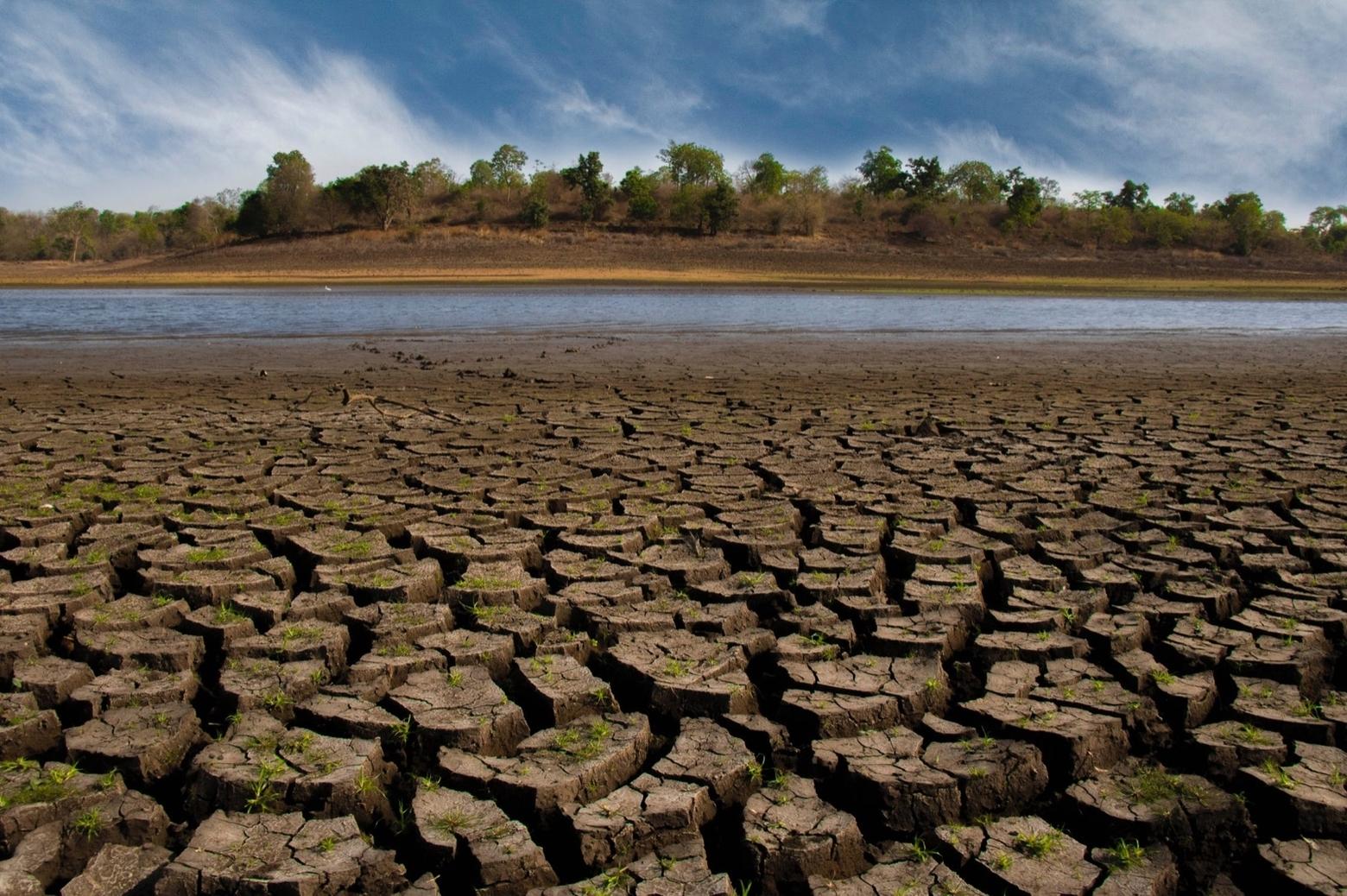
In the quest to prime the pump of our economy, we use more fossil fuels which raises temperatures which will result in less precipitation in the already-arid and water-challenged West. Lance Olsen says it’s no prescription for sustaining a human and environment-friendly economy. Photo courtesy Pexel The only way to avoid that change is to embrace the change we need to make.
The first sentence of the executive summary of the IPCC Special Report on 1.5 C advises policymakers that, “Limiting global warming to 1.5°C would require rapid, far-reaching and unprecedented changes in all aspects of society.”
In a nutshell, if we avoid making the sacrifices necessary to further that particular set of far-reaching and unprecedented changes, we’ll get another — and plausibly nastier — set of far-reaching and unprecedented sacrifices in all aspects of society. We’ll give up a lot to get a soft-as-still-possible landing, or give up a lot more in a crash.
In a nutshell, if we avoid making the sacrifices necessary to further that particular set of far-reaching and unprecedented changes, we’ll get another — and plausibly nastier — set of far-reaching and unprecedented sacrifices in all aspects of society.
There’s a lot of money at stake. The moneyed world has recently come wide awake to the economic damage made likely by continuing the combustion of fossil fuels. In an article under the headline, Climate change threatens to wreak havoc on the global economy,” the January 25 2019 issue of World Finance magazine advised its readers that, “It is becoming more and more apparent that the developing threat of climate change is not simply damaging the earth’s natural ecosystem, but is also harming the world economy.”
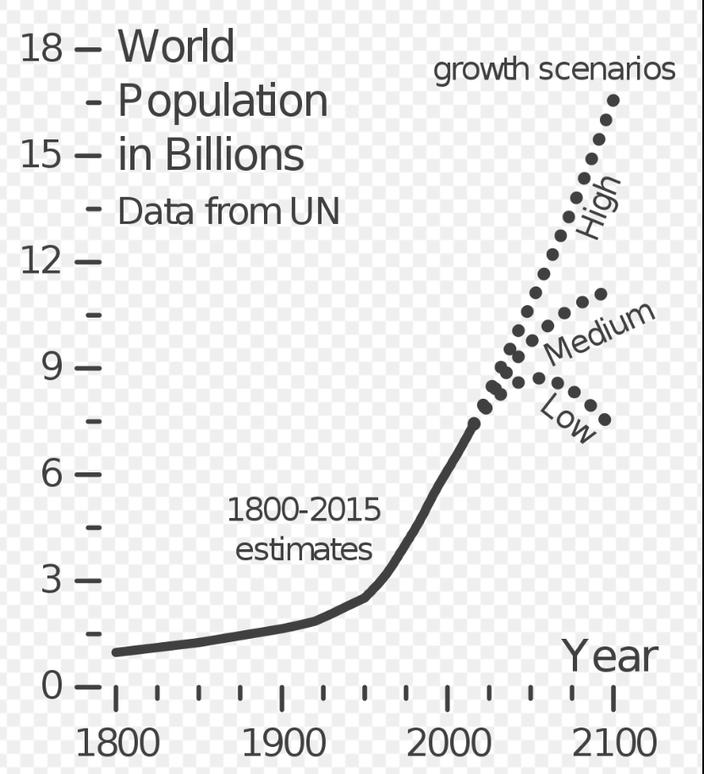
More specifically, the Institutional Investors Group on Climate Change, reportedly managing climate-vulnerable assets worth more than twice the value of the entire Chinese economy, has launched a campaign of lobbying governments to get away from thermal coal, andput an end to subsidizing all the fossil fuels, and to get on with putting a price on carbon emissions from fossil fuel combustion.” This amounts to a direct pushback against policy touted by Trump and the Republicans and, since pushing back, the Institutional Investors Group on Climate Change ranks have grown from 415 to 477.
Plainly enough then, the moneyed world’s worries are beginning to sound a lot like those voiced by advocates of the Green New Deal and campaigners of Fridays for the Future and the Extinction Rebellion.
So, where are the Republicans? Democrats on the Senate Banking Committee recently grilled Fed Chairman Jerome Powell on the Fed’s response to a changing climate. They made no reference to Kevin Anderson’s dire scenario, or to risk of a recession that goes on forever. They did, however, succeed in getting Powell’s opinion that human-caused climate change does pose financial risk.
Republicans, meanwhile, launched a conservation caucus aimed, according to The Hill, at battling the perception that their party doesn’t care about climate change. Like the Democrats, they made no reference to Kevin Anderson’s dire scenario, or to risk of a recession that goes on forever. Instead, Sen. Lindsey Graham of South Carolina where the coastal Low Country is vulnerable to going under water, said the Green New Deal is “crazy economics,” adding that “We believe our friends on the other side care about the environment, but they care so much they’re going to destroy the economy in the name of saving the environment.”
In an editorial on July 13, 2019, the right-leaning Washington Examiner picked up that accusation with a headline declaring that, “The Green New Deal was never about climate change; it’s just AOC’s excuse to destroy America’s economy.”
Interestingly, according to The Hill, the Republican “caucus members… stressed that traditional energy sources like coal, oil and gas would remain a part of the mix.” This is happening at the same time insurance companies are warning possibly not issuing policies to property owners who build in areas prone to climate-related natural disasters, such as wildfire and coastal areas. Republicans, standing by their reputation as guardians of the economy and advocates of capital investment, now promote a continuing push toward 4 degrees C? Huh?
About Lance Olsen
Lance Olsen has been involved with science and wildlife conservation in the Northern Rockies for more than four decades. A former executive director of the Missoula, Montana-based Great Bear Foundation, he worked with noted bear researchers, including Drs. Charles Jonkel and John Craighead. He is based in Missoula, Montana.
